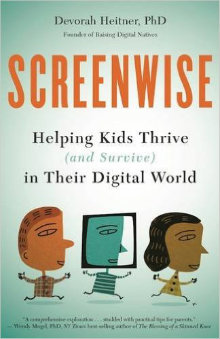Help Kids Thrive in a Screen-Filled World
Screenwise: Helping Kids Thrive (and Survive) in Their Digital World
By Devorah Heitner
(Routledge, 2016 – Learn more)

This book made me wince. Now, before you assume that’s a bad thing, let me elaborate. This book made me think. It made me reflect. It made me smile. It made me nod. And, yes, it also made me wince because I looked in the mirror as both an educator and a parent and saw that while there is much I do in both camps, there is still far more I should be doing.
A Positive Take on Living in This Digital World

Heitner’s voice is as warm as her advice. We all have those girlfriends in whom we confide our insecurities as a parent. Heitner is our confessional and her advice is non-judgmental. There is a “me too” tone to everything in this book that embraces you and makes you feel like her advice is totally do-able.
At the same time she challenges us in our own use. How do we unplug our kids when we, the adults, are plugged in ourselves? What does family time look like in a more digital world? And how can we leverage this knowledge in our classroom practice?
The positivity in this book is so appreciated. It isn’t about how to limit but rather how to find comfort in letting go in an educative way. It’s about setting limits with the purpose of helping our children learn to live in a limitless world.
Screenwise clearly isn’t just about THEM, the students; it’s about US, the teachers and parents. It challenges that our own digital education is vital in raising our children to the next level. We can’t be outsourcing the responsibility to model good digital use and leave it to schools alone. We are partners in this task.
Teachers and Parents as Partners in Modeling Tech Use
From an educator’s perspective, Screenwise is vital. We need to see into the window of how our students are using their devices at home in order to help them achieve at school. Furthermore, we can’t condemn them for it.
On the contrary, Heitner takes the leveled perspective that helping our children understand their place in the digital world takes ensuring that we, as adults, also have a place in it. “While there are a lot of things we don’t want our kids to be doing with technology,” she says, it’s important not to shut down devices, but instead, “live with, and actually thrive with, technology day to day.”
While Screenwise spells much out for parents, from an educator’s perspective, the potential in this book to help our school communities is great. I can see hosting parent information nights and handing out the book to attendees. I can see keeping a copy in the parent lounge or hosting a book talk or Twitter chat through PTA. This is a book from which PowerPoints are made. Better yet, bring in Heitner herself. Her written voice alone is like sitting down for dinner with a friend.
I like a resource that asks me to think, that doesn’t just help me get my students to think.
After all, thinking is something we must model. Along those lines, this books models the following by breaking things down into digestible pieces:
- The process of assessing your own comfort with tech.
- The process of saying yes, not no, to apps and games.
- The process of modeling the act of making good decisions, even about programs and tools you may not know now.
Heitner models a growth mindset for adults. After all, mistakes do happen. We have to know that going in. It’s unavoidable and necessary. It’s about adopting a growth mindset about tech use, not just about how to make it efficient or to produce something correctly, but in how we engage with life around us. And that includes our family.
Tech Use from a Child’s Perspective
The author goes into detail to help us understand our place in the teaching of our children, and even includes the voices from the students themselves. For instance, I love her list of “Rules for Parents” from 5th graders who show a very clear understanding of the limits they wish adults would set for themselves.
- No talking and driving—I hate it when my mom puts in headphones and doesn’t even talk to me on the way home.
- Don’t watch TV so loud (and late). It wakes me up.
- I hate when my mom makes me text for her when she is driving.
- No talking on the phone or texting at dinnertime or social time.
- Don’t post pictures of me on Facebook without permission.
- Limit phone conversations to 30 minutes (“Sometimes you talk to your sister for two hours!”).
- Don’t say “Five more minutes” and then stay on the phone (or e-mail) for two hours.
Plenty to think about
My only criticism, if you can call it that, is in how many topics the book covers. It provides insight into many concepts to consider, but still manages to go deeply into the how with many of them.
From “Assessing Your Own Digital Literacy” to “Family Life in the Digital Age,” and from “School Life in the Digital Age” to “Digital Citizenship for the Next Generation,” Screenwise hits many bases and takes on both the why and the nitty-gritty of how.
It goes into the language to use, the things to watch out for, and the prejudices you yourself might have in how we handle our children’s inevitable adoption of technology.
I admit Devorah Heitner’s newest book had me walking away feeling like there was a list of strategies I hadn’t yet put in place in my own parenting and even in my own classroom. But her advice echoed warmly from one of her recent talks: “You can do it…You have the wisdom to guide your child.”
Heather Wolpert-Gawron (@TweenTeacher) is an award-winning middle school teacher and passionate ed tech advocate. She is the author of ‘Tween Crayons and Curfews: Tips for Middle School Teachers, Writing Behind Every Door: Strategies to Teach Common Core Writing Across the Curriculum, DIY Project Based Learning for ELA and History and 2016’s DIY Project Based Learning for Math and Science. Heather blogs at Edutopia and at TweenTeacher.

































